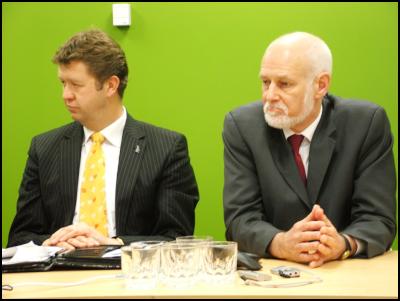Hodgson Doesn't Want To 'Play Politics' Over
AIDS – Will Anyone?

Health Minister Peter Hodgson pointed out in a media conference today that when dealing with AIDS he wasn't interested in playing politics.
"When politics does interfere [in regard to AIDS] it's never good," explained Mr Hodgson
The New Zealand Government approved a Special Zimbabwe Residence Policy (SRP) in 2005. About 500 Zimbabweans have been granted residence under the SRP, but many who are eligible have yet to come forward to apply for residence.
There is a suspicion from officials that many potential residents are not coming forward because of uncertainty around their HIV status.
Cabinet has set a closing date of February 28, 2007 for applications under the Special Residence Policy (SRP), established in July 2005 for Zimbabweans here before October 2004. Temporary permits would be extended to provide time for residence applications to be decided.
"Cabinet also agreed to offer residence to these individuals regardless of their health status as long as they meet other requirements, such as being of good character as shown by police and other checks," Mr Cunliffe said in a press release.
NZ First leader Winston Peters considered that New Zealanders were paying the price for successive National and Labour Governments policies.
"Now we find that New Zealanders are being expected to pay the price for such a cavalier approach, with the government deciding to allow hundreds of HIV-positive migrants and refugees to come forward and claim the residency they were promised, without fear of being declined on health grounds," he said today.
However in late 2004 Scoop contacted National and NZ First’s immigration spokespeople, Tony Ryall and Dail Jones for comment on why New Zealand was making a policy exemption for Zimbabwean citizens.
Both agreed with the Government's handling of the situation, Mr Jones pointing out that, “they play cricket and rugby so what more do you want.”
Mr Ryall didn’t want to make any comment because he agreed with what the government was doing. Mr Ryall did however at the time assure Scoop he would look into the situation.
The Governments policy exemptions that allowed Zimbabweans to stay in NZ were roundly championed by Federated Farmers in 2004.
“Many Zimbabweans work on New Zealand farms and this policy change gives them some security that they and their families can stay," said FFNZ Vice President Charlie Pedersen at the time.
The prevalence of AIDS is higher among black Zimbabweans than those from the white farming community according to Immigration Minister David Cunliffe.
The Government had no exact figures as to what the ethnic mix was of black and white Zimbabweans currently living in NZ but it is thought to be 50-50.
The UN AIDS 2006 Report found the prevalence rate of HIV in Zimbabwe was on average 20.1 percent.
It is estimated that of the 800 Zimbabweans who have yet to apply for residence in New Zealand and be screened, using a prevalence rate of 20 per cent, up to 160 could be infected with HIV.
According to the Government if all required antiretroviral treatment it could cost around $2.9 million a year.
Listen to the full briefing from Ministers Cunliffe and Hodgson - questions from the media begin at around 11 mins 45s
ENDS



 Jim Mikoz: Look Out Rocks … Oops Too Late
Jim Mikoz: Look Out Rocks … Oops Too Late Peter Dunne: Dunne’s Weekly - National And Labour Combine To Shut Out Greens
Peter Dunne: Dunne’s Weekly - National And Labour Combine To Shut Out Greens Ramzy Baroud: Voting Against Genocide - How Gaza Defeated The Democratic Establishment
Ramzy Baroud: Voting Against Genocide - How Gaza Defeated The Democratic Establishment  Alastair Thompson: Google's Support For Democracy And Media In NZ | Part 2
Alastair Thompson: Google's Support For Democracy And Media In NZ | Part 2 Eugene Doyle: BBC Goes Full Goebbels In Support Of Israeli Soccer Hooligans
Eugene Doyle: BBC Goes Full Goebbels In Support Of Israeli Soccer Hooligans Binoy Kampmark: They Were There First - Election Denialism, The Democratic Way
Binoy Kampmark: They Were There First - Election Denialism, The Democratic Way